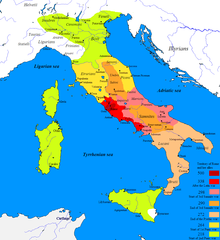Quintus Publilius Philo

Quintus Publilius Philo was a Roman politician who lived during the 4th century BCE. His birth date is not provided by extant sources, however, a reasonable estimate is c365 BCE given he first became consul in 339 BCE. Consuls were regularly elected in their twenties during the fourth century (Bagnall et al. 1987, p. 2.).[1] His praenomen (Quintus) suggests that he was one of five siblings. Lucius Papirus, who shared his several positions with Quintus, is presumed to have been his brother[2]. Publilius, his nomen, identifies his gens (house) as being the Publilii. This family was plebeian, yet included a variety of prominent figures. The Publilius gens was first illuminated upon the election of Publilius Volero as tribune in 472 BCE[3]. Volero passed two important pieces of legislation which increased the power of a Tribune [4]. Clearly, Philo came from a family accustomed to promoting the rights of the plebs. It is noted that his cognomen ‘Philo’ was unique to his family. The Publilii gens is said not to have had any prominent descendants. However, the noble women Publilia, who lived circa 154BCE, may have been a relative of Philo. She was accused of murdering her husband, a former consul despite Publilia’s plebeian status [5] Other potential descendants of his gens include Titus Publilius who was one of the “five augurs of the plebs” circa 299BCE [6] An Augur was somebody who acted as a priest (Dillon et al pg145 ). Each of these individuals exemplify that plebeian status within society can propel oneself into a life of good fortune and comfort. As it was known that the Publilii gens did not come from nobility, this family was a pillar within Rome in politics, the arts and the military.
Early Career
Quintus Publilius Philo first became consul in 339BC. During his first term, Philo retaliated against the Latins who sought to reclaim territories that were previously lost to Rome. He was supported by proconsul Titus Aemilius Mamercinus. The most prominent event was Philo’s assault on the Latin forces camped in the Fenectine Plains. Philo remained on the defensive of Latin territories whilst Mamercinus attempted to besiege Perdum.[7]
During the same year, Philo was appointed to the role of dictator. At this time it was considered appropriate to appoint a dictator to swiftly govern the Republic given the divisive nature that times of war bring. Philo was the second Roman from a plebeian background to hold the office of dictator, the first being Marcus Rutilius in 356 BC. He made a series of popular reforms championing the plight of the plebeians. Such measures included legislation binding plebiscites to all citizens, giving the Comitia Centuriata greater involvement in voting on laws and ensuring that one Censor must always be a plebeian. (Rotondi 226-228)[8].
In 336 BC, Philo’s reputation as a novus homo’ within the Roman senate was consolidated even further when he became the first Praetor from a plebeian background. Philo’s ascension to the praetorship was opposed by the incumbent consul Sulpicius who as a patrician naturally believed a plebeian was undeserving of the office. [9]
Furthermore, Philo served as magister equitum (Master of Horses) [10] meaning he was essentially a co-dictator in 335 BC [11]. A Master of the Horses was an emergency magistrate appointed by the Dictator, who held imperium. It is likely Philo had a political partnership with his family, as he shared this position with his (probable) brother Lucius [12] He went on to become Censor in 332 BC because of his legislation he passed whilst dictator in 339 BC ensuring one Censor was of plebeian origin. As Censor, who in such a role maintains the census of all Roman citizens, Philo enrolled newly subjugated Latins as citizens, specifically the tribes of Maecia and Scaptia as a means of legitimately uniting the newly conquered Latins into the Roman Republic as part of his duties documenting Roman citizens.
Later Career
References
- ^ Bagnall, Roger S. (1987). Consuls of the later Roman Empire. Scholars Press. p. 2.
- ^ Oakley, S.P. (1998). A Commentary on Livy, Books VI–X, Vol. 2: Books VII–VIII. Oxford University Press. p. 212.
- ^ Simon Hornblower, Antony Spawforth (2005). The Oxford Classical Dictionary. Oxford University Press.
- ^ Broughton, T.Robert. S. (1984). Magistrates of the Roman Republic. Atlanta, Ga. : Scholars Press. pp. 29, 30.
- ^ Livy per. 48.13.
- ^ Livy 10.9.2.
- ^ Liv.8.12.12-17
- ^ Giovanni, Rotondi (1912). Leges publicae populi romani. pp. 226–228.
- ^ Liv. 8.15.9.
- ^ Liv.7.2.1.
- ^ Degrassi, Atilius (1947). Fasti consulares et triumphales, curavit Atilius Degrassi. p. 107.
- ^ Oakley, S.P. (1998). A Commentary on Livy, Books VI–X, Vol. 2: Books VII–VIII. Oxford University Press. p. 212.
